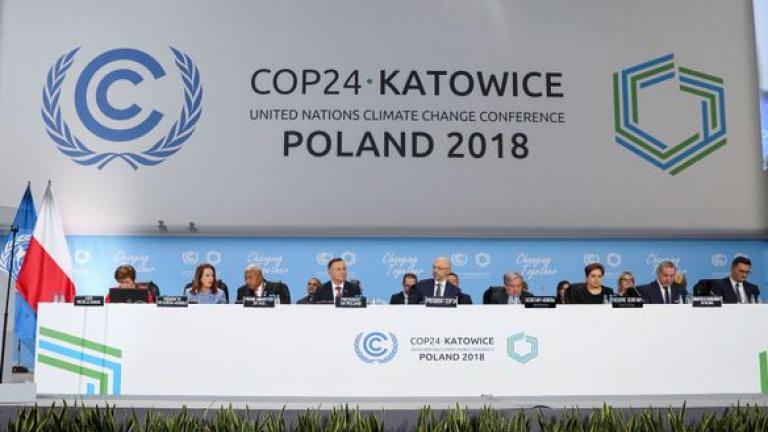
This week marks the second and final week of the United Nations' annual international climate change conference, COP 24. (Why is it called COP24?)
In 2015, nearly 200 government leaders famously signed what is now called the Paris Agreement, where each country submitted their own plans to slow down carbon emissions. At this year's COP, negotiators, government officials, nonprofit organizations and others are revisiting progress on the Paris Agreement and carving out next steps for the future. (Even though the United States pulled out of the Paris Agreement, US still sent delegates to represent the country.)
Here's what MIT groups are posting about COP and the Paris Agreement:
- Start here: "Climate Change will not wait for us"
Article by Emily Dahl of the MIT Energy Initiative
A summary of MIT's participation at COP, where MIT researchers shared knowledge and tools to help nations meet Paris Agreement targets. You can also check out: MIT at COP24 in Katowice, Poland, a list of events and activities of the MIT delegation at COP24.
- Podcasts from COP24, brought to you by the MIT Energy Initiative:
- Emissions trading and Paris Agreement Article 6
At COP24, MITEI interviews Constanze Haug, head of the secretariat of the International Carbon Action Partnership, and Michael Mehling, deputy director of the MIT Center for Energy and Environmental Policy Research, about the linking of different emissions trading systems. - British Columbia and the energy trilemma
At COP24, MITEI discusses British Columbia's UNFCCC award-winning climate policies with George Heyman, minister of environment and climate strategy for British Columbia, and Sergey Paltsev, MIT Energy Initiative senior researcher and deputy director of the MIT Joint Program on the Science and Policy of Global Change. - Climate policy paths for Latin American and Asian nations
Lessons from two "Pathways to Paris” climate policy and technology reports with Rob McKeel, GE Power VP and CMO, and Sergey Paltsev, MIT Energy Initiative senior researcher and deputy director of the MIT Joint Program on the Science and Policy of Global Change.
- Emissions trading and Paris Agreement Article 6
- Articles and working papers:
- Why the next two years are critical for the Paris climate deal’s survival
Henry Jacoby and Jennifer Morris of the MIT Joint Program on the Science and Policy of Global Change
The authors argue that meeting the Paris Agreement's ambition to limit global warming to 2°C requires a dramatic turnaround in emissions in the very near future.
- Governing Cooperative Approaches under the Paris Agreement
Working paper by Michael Mehling of MIT Center for Energy and Environmental Policy Research
The Paris Agreement allows countries to collaborate as they work toward acheiving their national climate action plans, including finding market-based approaches to lower the cost of achieving their national objectives. This paper explores the opportunities and concerns of this provision in the agreement.
- Technology and policy pathways to Paris emissions goals
By the MIT Joint Program on the Science and Policy of Global Change
The article outlines modeling tools developed by groups at MIT that can evaluate the progress and potential of two major world regions -- Southeast Asia and Latin America -- to help reach global emission goals.
- 3Q: Kathleen Kennedy on community-level climate resilience at COP24
Post by the MIT Energy Initiative
At COP24, Kathleen Kennedy, executive director of MIT’s Center for Collective Intelligence, moderated a discussion with winners of an MIT Climate CoLab contest co-sponsored by the United Nations. Here, she talks with MITEI about the winning projects and how this collaboration with the UN ties into the broader themes of the climate conference.
- Why the next two years are critical for the Paris climate deal’s survival
- Related recently-posted courses:
- International Environmental Negotiation
Course materials by Prof. Lawrence Susskind (MIT) and Prof. William Moomaw (Tufts University)
This seminar explores the difficulties of building international support for efforts to combat climate change created by greenhouse gas emissions as well as other international resource management efforts.
- International Environmental Negotiation
This year's UN international climate change conference is officially known as the 24st Conference of the Parties (or “COP”) to the United Nations Framework Convention on Climate Change (UNFCCC). UNFCCC is the United Nations body which is responsible for climate change and based in Bonn, Germany. The UN calls them "parties" because they can be countries or other kinds of government entities (for example, Vatican City) that are signatories to the UNFCCC body.





